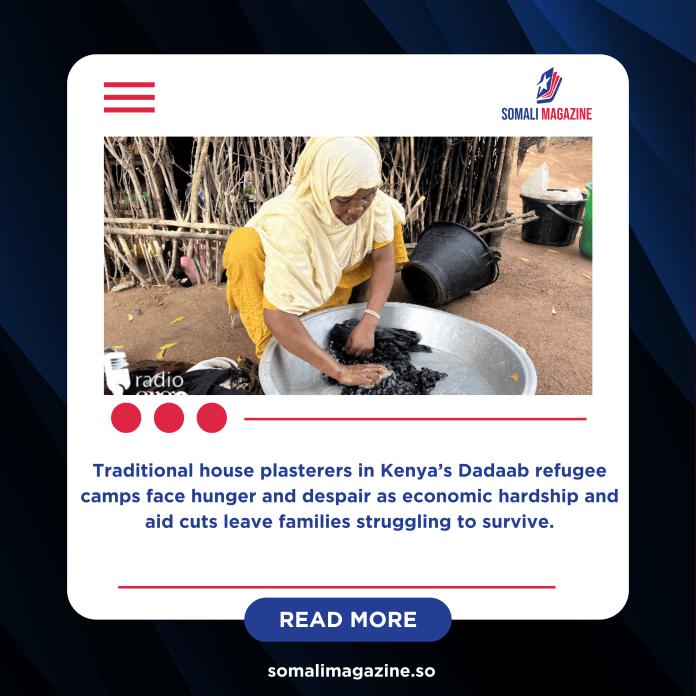Facebook Twitter (X) Instagram Somali Magazine - People's Magazine
In the refugee camps of Dadaab, Kenya, many Somali women who once earned a living through traditional house plastering are now jobless and struggling to survive. The shrinking economy in the camps and cuts in aid have left hundreds of families in crisis.
Khadija Hassan Mohamed, a mother of 11, used to plaster houses using a mix of soil and cow dung—a skill she brought from her home in Jamame, Somalia. For 14 years in Dadaab, this work supported her family, bringing in 10,000 to 15,000 Kenyan shillings per month.
But things changed in April when her plastering work suddenly stopped. Fewer houses are being built in the camps due to lack of funding, and those who can build now prefer using iron sheets instead of traditional materials. “Since the jobs ended, our situation has become worse. We can’t even afford the food we used to cook,” Khadija said.
Her husband, who worked in construction, has also been without work since early this year. The family now relies on water collected from a well three kilometers away, and their children have been sent home from school for not being able to pay 400 shillings for supplies.
Khadija previously received 9,000 shillings monthly from the World Food Programme (WFP), but that stopped in May. Food rations were also cut. The 30 kilograms she received now lasts less than two weeks. “I go out every day to look for laundry work. If I find some, I cook. If not, we go hungry. Sometimes I just bathe the children and put them to sleep without food.”
Faduma Abdiqadir Khamis, another house plasterer from Jamame, is also facing hardship. She supports a large family of 15, including her five children and siblings. Since plastering jobs disappeared, they rely on food from relatives—when available. “Last night and the night before, I didn’t cook anything. The kids went to bed hungry and woke up hungry,” she said.
Faduma fell ill while washing clothes for a family in May and fainted from exhaustion. Doctors at the camp hospital diagnosed her with high blood pressure and diabetes. Now unable to work, she stays at home. “We’ve lost hope. No food, no clothes, no school for the children,” she said. Her husband, who used to push a handcart for money, is also out of work. Their last food aid ran out in early July.
Their shelter, built by fellow refugees when they arrived in 2022, was damaged by strong winds. They cannot afford to repair it. They also face severe water shortages, with her husband walking five kilometers daily to fetch just three jerrycans of water, which isn’t enough.
According to Amina Abdiqadir Ali, a local leader working with the Women Lead Steering Committee, over 200 women who used to work as plasterers have been out of work since early this year. “Women who used to do small jobs like plastering, washing clothes, or running small food stalls are no longer working. There are no more opportunities,” she said.
The situation has hit young people too, many of whom have completed school but can’t find jobs. Cuts in humanitarian aid have worsened life in the camps, leaving families without food, water, education, or hope.
The women of Dadaab, once the backbone of their families through hard physical work, now sit idle, unsure how to support their children. The loss of simple jobs has led to hunger, illness, and despair in homes that once managed to get by through dignity and hard work.

